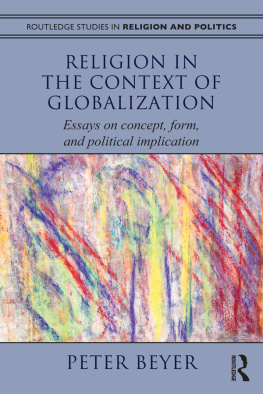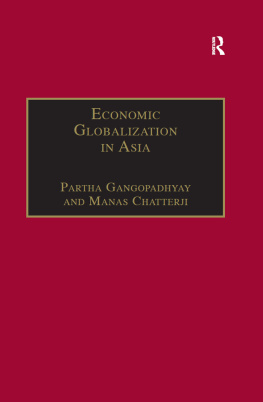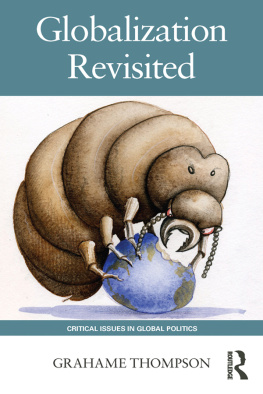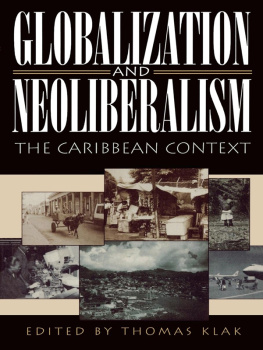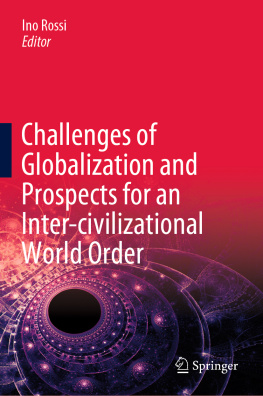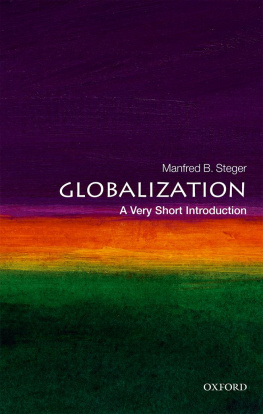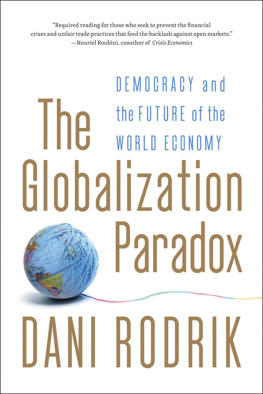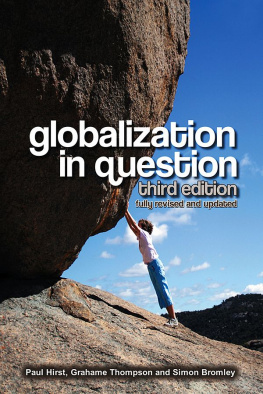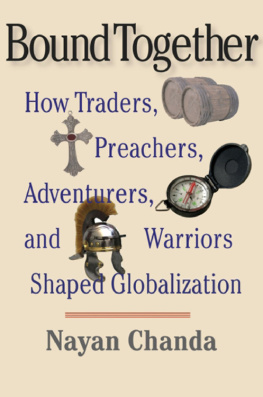A World Connected
Globalization in the 21st Century
Preface by Richard C. Levin
Edited by Nayan Chanda and Susan Froetschel
A YaleGlobal Online Ebook
Yale Center for the Study of the Globalization/New Haven, USA
First published in the USA in 2012 by YaleGlobal Online
Yale Center for the Study of Globalization
New Haven, CT 06520
Copyright 2012 Yale Center for the Study of Globalization
All rights reserved. No portion of this e-book may be reproduced
in any fashion, print, facsimile, electronic, or by any method
yet to be developed, without express written permission of
the Yale Center for the Study of Globalization.
Photos: Courtesy of Reuters
A World Connected: Globalization in the 21st Century
Edited by Nayan Chanda and Susan Froetschel
Includes preface by Richard C. Levin
ISBN: 978-0-9779922-0-1
Cover design: Debbie Campoli
Book design and typesetting: Lynne Reichentahl and Debbie Campoli
Contributors
Morton Abramowitz
Graham Allison
Hakan Altinay
Christopher Anzalone
Mohammed Ayoob
Ashok Bardhan
Pranab Bardhan
Hans Blix
Clifford Bob
James K. Boyce
Dieter Braeuninger
Joseph Chamie
Anita Chan
Nayan Chanda
Gordon G. Chang
Carolyn E.B. Choksy
Jamsheed K. Choksy
Michele A. Clark
James Cuno
Anthony P. DCosta
David Dapice
Alex David
Kemal Dervis
Sadanand Dhume
Bo Ekman
Jonathan Fenby
Richard W. Fisher
Ann Florini
Thomas L. Friedman
Susan Froetschel
Ioannis Gatsiounis
Jayati Ghosh
Dru Gladney
Bernard K. Gordon
Alkman Granitsas
Richard N. Haass
Jim Hansen
Riaz Hassan
Humphrey Hawksley
David L. Heymann
Dilip Hiro
Richard Hornik
Yanzhong Huang
Dwight Jaffee
Harold James
Rami G. Khouri
Peter Kwong
Pascal Lamy
Jean-Pierre Lehmann
Richard C. Levin
Andrew Lih
Bertil Lintner
Richard G. Lipsey
Terrence Lyons
Rebecca MacKinnon
Mary Kay Magistad
Kishore Mahbubani
Ashok Malik
Peter Mandaville
Michael Mandelbaum
Peter Mandelson
Bruce Mazlish
Suketu Mehta
Branko Milanovic
Barry Mirkin
N.R. Narayana Murthy
Chandran Nair
Paula R. Newberg
Lonce Ndikumana
Rohini Nilekani
Sharon Noguchi
William D. Nordhaus
Joseph S. Nye Jr.
Rajendra K. Pachauri
Thomas Palley
George Perkovich
Michael Pettis
Clyde Prestowitz
Lant Pritchett
Gustav Ranis
Sean Randolph
Ahmed Rashid
Carmen M. Reinhart
Michael Richardson
Bruce Riedel
Alexis Eva Ringwald
Mary Robinson
David J. Rothkopf
Patrick Sabatier
Shyam Saran
Jonathan Schell
Orville Schell
Amartya Sen
Shen Dingli
Shim Jae Hoon
James Gustave Speth
Joseph Stiglitz
Bruce Stokes
Strobe Talbott
Ramesh Thakur
C. Peter Timmer
Jonathan Unger
Vivek Wadhwa
Immanuel Wallerstein
Jeffrey Wasserstrom
Gabriel Weimann
Patricia Wruuck
Guobin Yang
Ernesto Zedillo
Contents
Preface
As President of Yale University, I often participate in ceremonies dedicating new or renovated facilities. Ten years ago, on November 19, 2002, I drove to the newly refurbished Betts House for such an occasion, where, instead of cutting a ribbon I clicked on a mouse to launch YaleGlobal Online. The founding of the Yale Center for the Study of Globalization in the previous year and the launch of YaleGlobal created an important new bridge connecting Yale to an increasingly globalized world, and put us in a stronger position to contribute to the discussion about its evolution.
It is now widely understood that the world has become smaller and more interconnected. The revolution in communications technology has brought the world closer together and changed the way we think. The movement of capital across borders is now instantaneous, and the movement of people, products, and pollution is freer and faster than ever before. These facts make comprehensive governance of the economy impossible at the level of the nation-state. International institutions are needed to regulate trade, capital flows, and environmental degradation. Isolation is not an option. For the past ten years, YaleGlobal, edited by Nayan Chanda, former editor of the Far Eastern Economic Review and The Asian Wall Street Journal Weekly, has provided a steady stream of original reports on and insightful analysis of our interconnected and interdependent world.
Cross-cultural influences have always been a part of Yales history and tradition. Yale was founded with a gift from Elihu Yale, former governor of the East India Company in Madras (now Chennai) India. Yung Wing, the first Chinese student to come to a U.S. university, graduated from Yale in 1854. But only recently has intensified globalization created tremendous opportunities for Yale and other universities around the world. YaleGlobal is one response to these opportunities, and I am delighted to see how it has blossomed in the past decade. Its rich content, produced by Yale faculty as well as scholars and experts worldwide, is accessed daily by thousands of people in some 160 countries. Reproduced in newspapers and other websites, YaleGlobal articles are read by millions of readers all over the globe. I hope that this collection, A World Connected: Globalization in the 21st Century, will prove to be a handy guide to understanding the complex and evolving phenomenon of globalization. It is a compendium of carefully selected articles from the more than one thousand essays that YaleGlobal has published.
Yale University continues to adjust its curriculum and programs in order to analyze and understand the full array of global challenges confronting our planet. Global security is threatened by instability in the Middle East and by persistent terrorism that strikes almost randomly at civilized peoples around the world. Global prosperity is threatened. The global free trade regime that brought hundreds of millions out of poverty in the past quarter century is in jeopardy because of the parochialism of nations unable to see the common good. And unless we resolve to cooperate and do something about our environment, the biodiversity of the planet will continue to diminish at an alarming rate, and global warming will transform the conditions of life and livelihood around the world. With intelligent and timely analysis, YaleGlobal and its first e-book, A World Connected: Globalization in the 21st Century, perform the valuable task of raising awareness about our interconnected world and highlighting the need for international cooperation and better governance.
Richard C. Levin
President, Yale University
Introduction
Ten years ago, on a chilly November day, an improbable venture was launched in a corner of the Yale University campus an online multimedia magazine to explore the phenomenon of globalization and promote debate and analysis on that highly contentious subject. As the flagship publication of the Yale Center for the Study of Globalization, YaleGlobal Online was not meant to be a general magazine on international affairs, nor a publication devoted to business and the economy, so often considered to be synonymous with globalization. YaleGlobals mission was to follow globalization as it unfolds in all spheres of life. Our mission is informed by our understanding of globalization as a historical process, a process that has increasingly connected the world and grown ever since early humans left their homes in search of better and more fulfilling lives. Commerce, proselytization, travel and conquest are but a few of the channels of connection that have tied the world together ever more tightly. YaleGlobals foundational essay,


